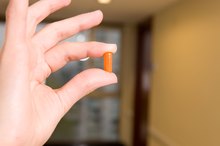What Is the Difference Between B-12 & Methyl B-12?
Vitamin B-12 usually refers to cyanocobalamin, the most common form. Another form of B-12 is methylcobalamin, also called methyl B-12. B-12 is needed in the formation of DNA, nerves and red blood cells. It also helps the thyroid make hormones that regulate energy production and metabolism. B-12 supplements may be beneficial if deficiencies exist due to genetic factors, or lack of B-12 in the diet.
Methylcobalamin vs Cyanocobalamin
Methyl B-12 is more active in the body than cyanocobalamin. It helps regulate homocysteine levels. High homocysteine levels are indicated in stroke, kidney disease, dementia and Alzheimer's disease. In contrast, cyanocobalamin has no effect on homocysteine levels. Individuals with these conditions may benefit from methyl B-12 over cyanocobalamin. If a deficiency is present, your doctor will help determine the best form.
- Methyl B-12 is more active in the body than cyanocobalamin.
- Individuals with these conditions may benefit from methyl B-12 over cyanocobalamin.
Dosage
Vitamins Necessary for Alcoholics
Learn More
The National Institutes of Health indicate a recommended dietary intake of B-12 as 2.4 micrograms per day for adults and children 14 and older. Women pregnant or breastfeeding are recommended to get 2.8 micrograms daily. Infants younger than six months should have 0.4 micrograms per day. Those with a deficiency require higher amounts, sometimes up to 10,000 micrograms per day.
- The National Institutes of Health indicate a recommended dietary intake of B-12 as 2.4 micrograms per day for adults and children 14 and older.
- Women pregnant or breastfeeding are recommended to get 2.8 micrograms daily.
Considerations
Adequate B-12 is usually acquired from food. Because cyanocobalamin is converted to methyl B-12 in the body, it may be unnecessary to supplement the methyl form of B-12. In rare cases, some individuals posses a biological inability to convert methyl B-12 from cyanocobalamin. In this case, a methyl B-12 supplement may help.
- Adequate B-12 is usually acquired from food.
- In rare cases, some individuals posses a biological inability to convert methyl B-12 from cyanocobalamin.
Safety
Pyridoxine Hydrochloride Dangers
Learn More
The National Institutes of Health recognize B-12 as generally safe for most individuals. In rare cases, side effects can occur. These include, upset stomach, blood clots, diarrhea and allergic reactions. B-12 can interact with the antibiotic, chloramphenicol. In large doses, B-12 can reduce absorption of other B vitamins and vitamin C. Consult your doctor before supplementing either form of B-12.
- The National Institutes of Health recognize B-12 as generally safe for most individuals.
- In large doses, B-12 can reduce absorption of other B vitamins and vitamin C. Consult your doctor before supplementing either form of B-12.
Related Articles
References
Writer Bio
Janet Renee is a clinical dietitian with a special interest in weight management, sports dietetics, medical nutrition therapy and diet trends. She earned her Master of Science in nutrition from the University of Chicago and has contributed to health and wellness magazines, including Prevention, Self, Shape and Cooking Light.









